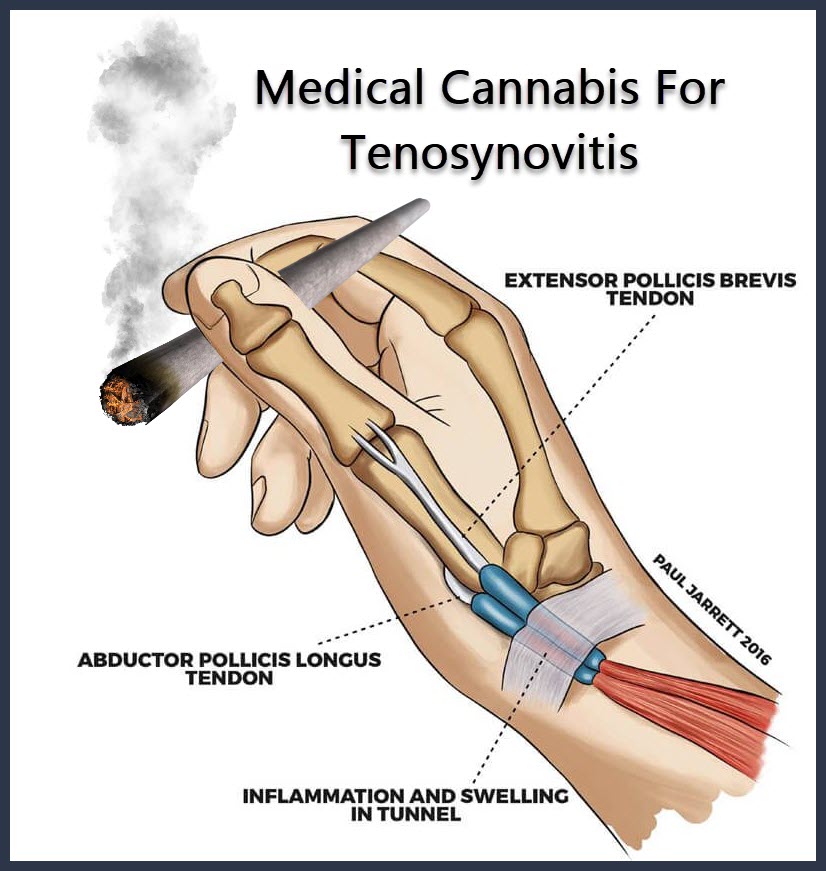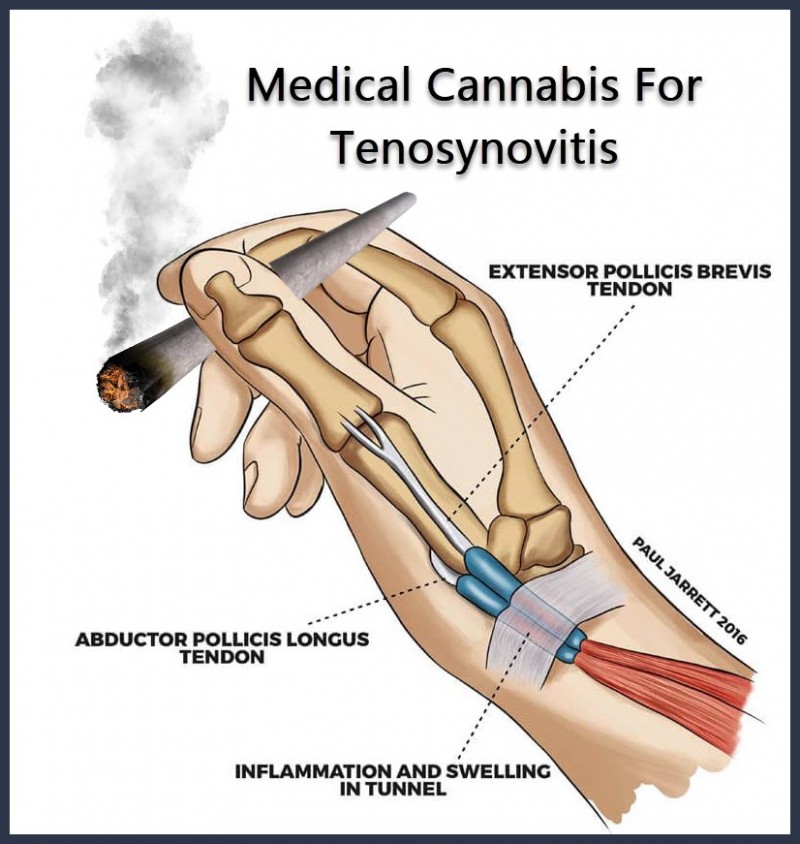Medical Cannabis For Tenosynovitis

When a person is doing activities that require repetitive movement, the person is also prone to injuries of the tendons. When something inflames one of your tendons, it can be a very painful experience. Tendons are the cords of tissue that hold muscle to the bone. When the tendons alone are inflamed, it is called tendinitis. But when the sleeve of tissue surrounding the tendon is also inflamed, it is called tenosynovitis.
Inflammation is not always harmful to the body. Sometimes it tells you to slow down a bit. Inflammation is used by the immune system to protect your body from foreign substances, like viruses or bacteria. But something like tenosynovitis lets your immune system act inappropriately.
If there is no foreign substance for the immune system to fight off, or the inflammation lasts too long, harmful side-effects and damage to healthy tissue could occur. Medical cannabis can treat inflammation and pain symptoms of tenosynovitis.
What is Tenosynovitis?
Tenosynovitis is synovial connective tissue inflammation. The synovium is a sheath that protects and covers a tendon. The tendon stays lubricated by the synovial fluid produces by the synovium. Sometimes a tendon injury can lead to malfunction of the sheath. The result is that the sheath either does not produce enough synovial fluid or nothing at all. This leads to inflammation. Tendonitis and tenosynovitis are not the same, but they often occur simultaneously.
Tenosynovitis often occurs in the wrists, hands, and feet, because this is where tendons in joints mostly lie. But it can happen in any tendon all over the body.
Common Causes
It is not always possible to identify the exact cause of tenosynovitis, but common causes include:
Diseases causing inflammation
Injury
Strain
Overuse
Infection
What are the Symptoms?
The first indication is normally a swollen or painful feeling around the tendon. It is more noticeable the more you use it. The problem worsens when the tendon sheath gets swollen and interference with fluid build-up occurs. Swelling can often be quite easy to see and it is very tender to the touch. It could happen anywhere in your body, but is more likely to occur in these areas:
Shoulder
Upper arm
Biceps
Hands and fingers
Knee
Achilles
When you have tenosynovitis, you might experience the following:
Swelling in the affected joint area
Pain
Difficulty moving the joint
Redness along the tendon
Tenderness around the joint
Those suffering from tenosynovitis can experience the condition to last for a few days, but it could also be like that for weeks on end. Sometimes a fever is also present, which makes it a very serious condition and help form a doctor should be looked for.
Underlying conditions that often lead to tenosynovitis are diabetes, rheumatoid arthritis, gonorrhea, gout, scleroderma, and Reiter´s syndrome or other reactive arthritis.
Why Cannabis is so Effective for Tenosynovitis
Cannabis has extraordinarily strong anti-inflammatory properties. This makes it perfect to treat a condition like tenosynovitis. In preclinical trials at the University of Jerusalem, positive results for treating inflammation with cannabis has been noted. Inflammation causes much of the pain, swelling, and decreased mobility in the joints.
Tenosynovitis causes pain, and medical cannabis can also relieve pain. Research on how cannabis can relieve pain is even approved on the FDA level. THC, one of the main components in Cannabis, helps to relieve inflammation and pain at the same time. It is effective for chronic and acute pain. In addition, it also protects and prevents the destruction of the joint tissue.
As a plus point, medical cannabis is so much better than conventional medicine as it has fewer side-effects.
What symptoms of Tenosynovitis can Cannabis Treat?
Cannabis can help with symptoms like:
Joint pain
Inflammation
Trouble sleeping
Anxiety
Depression
Apart from reducing inflammation, cannabis can also manage condition-related pain with ease. The cannabinoids act on the CB1 and CB2 receptors in the endocannabinoid system. These receptors are involved in the mediation of inflammation-related pain. Cannabis also promotes better sleeping patterns, that in turn, helps with the reduction of inflammation. But it is not just THC, but also CBD, that works well to combat inflammation. CBD is particularly effective for chronic pain relief.
How to use Cannabis to treat Tenosynovitis
Cannabis can be taken orally as well as topically to relieve inflammation. Tenosynovitis might occur close to the skin surface. This is where cannabis as a topical ointment could work very well. The cannabinoids in the topical cream are also helpful for pain linked to deeper tissues, such as peripheral neuropathic pain.
Other than topical applications, cannabis could also be consumed by inhalation such as smoking or vaping. Edibles are also great for micro-dosing. Another option is a sublingual application via tinctures or oils.






